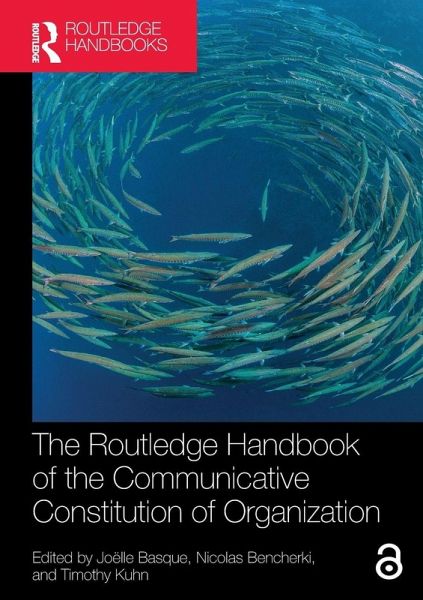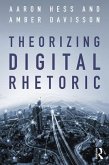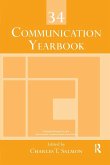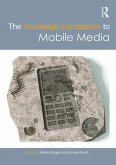The Routledge Handbook of the Communicative Constitution of Organization
Herausgeber: Basque, Joëlle; Kuhn, Timothy; Bencherki, Nicolas
The Routledge Handbook of the Communicative Constitution of Organization
Herausgeber: Basque, Joëlle; Kuhn, Timothy; Bencherki, Nicolas
- Broschiertes Buch
- Merkliste
- Auf die Merkliste
- Bewerten Bewerten
- Teilen
- Produkt teilen
- Produkterinnerung
- Produkterinnerung
This Handbook offers state of the art scholarship on the perspective known as the Communicative Constitution of Organizations (CCO).
Andere Kunden interessierten sich auch für
![Natural Bridges in Interpersonal Communication Natural Bridges in Interpersonal Communication]() Randy FujishinNatural Bridges in Interpersonal Communication55,99 €
Randy FujishinNatural Bridges in Interpersonal Communication55,99 €![The Routledge Companion to Social Media and Politics The Routledge Companion to Social Media and Politics]() The Routledge Companion to Social Media and Politics82,99 €
The Routledge Companion to Social Media and Politics82,99 €![Theorizing Digital Rhetoric Theorizing Digital Rhetoric]() Theorizing Digital Rhetoric65,99 €
Theorizing Digital Rhetoric65,99 €![Communication Yearbook 34 Communication Yearbook 34]() Communication Yearbook 3430,99 €
Communication Yearbook 3430,99 €![The Sesame Effect The Sesame Effect]() The Sesame Effect71,99 €
The Sesame Effect71,99 €![The Routledge Companion to Mobile Media The Routledge Companion to Mobile Media]() The Routledge Companion to Mobile Media87,99 €
The Routledge Companion to Mobile Media87,99 €![The Dynamics of Persuasion The Dynamics of Persuasion]() Richard M PerloffThe Dynamics of Persuasion126,99 €
Richard M PerloffThe Dynamics of Persuasion126,99 €-
-
-
This Handbook offers state of the art scholarship on the perspective known as the Communicative Constitution of Organizations (CCO).
Hinweis: Dieser Artikel kann nur an eine deutsche Lieferadresse ausgeliefert werden.
Hinweis: Dieser Artikel kann nur an eine deutsche Lieferadresse ausgeliefert werden.
Produktdetails
- Produktdetails
- Verlag: Taylor & Francis
- Seitenzahl: 540
- Erscheinungstermin: 4. Oktober 2024
- Englisch
- Abmessung: 246mm x 174mm x 30mm
- Gewicht: 948g
- ISBN-13: 9780367480721
- ISBN-10: 0367480727
- Artikelnr.: 71561563
- Herstellerkennzeichnung
- Libri GmbH
- Europaallee 1
- 36244 Bad Hersfeld
- gpsr@libri.de
- Verlag: Taylor & Francis
- Seitenzahl: 540
- Erscheinungstermin: 4. Oktober 2024
- Englisch
- Abmessung: 246mm x 174mm x 30mm
- Gewicht: 948g
- ISBN-13: 9780367480721
- ISBN-10: 0367480727
- Artikelnr.: 71561563
- Herstellerkennzeichnung
- Libri GmbH
- Europaallee 1
- 36244 Bad Hersfeld
- gpsr@libri.de
Joëlle Basque is Assistant Professor in the Department of Human Sciences, Arts and Communication at Université TÉLUQ in Montréal, Canada. Nicolas Bencherki is Associate Professor in the Department of Human Sciences, Arts and Communication at Université TÉLUQ in Montréal, Canada. Timothy Kuhn is Professor in the College of Media, Communication and Information at the University of Colorado Boulder, USA.
Foreword: The Emerging Paradigm of Communication Constitutes Organization
(CCO); Introduction; Part I: Theoretical Discussions; 1. The Theoretical
Roots of CCO; 2. What's Pragmatic about Ambiguity in the Communicative
Constitution of Organizations? The Case of CCO Scholarship's Establishment;
3. Organization as Conversation and Text; 4. Theorizing Communication and
Constitution of Organizations from a Four Flows (Structurational)
Perspective; 5. The Communicative Constitution of the World: A Luhmannian
View on Communication, Organizations, and Society; 6. The Multiple Roles of
Materiality When Communication Constitutes Organizations; 7. Disrupting CCO
Thinking: A Communicative Ontology of Dis/Organization; 8. The
Communicative Constitution of Organizationality; 9. The Communicative
Constitution of Epistemic and Deontic Authority: Epistemological
Implications of a Second-Order Construct; 10. Uncritical Constitution: CCO,
Critique and Neoliberal Capitalism; 11. Queering CCO Scholarship: Examining
Communication as Constitutive of (Hetero)normative Organizations and
Organizing; Part II: Opening Up CCO's Methodological Approaches; 12. The
Umbrella of Discourse Analysis and Its Role in CCO; 13. Acting in the Name
of Others: How to Unpack Ventriloquations; 14. Ethnomethodological
Conversation Analysis and the Constitutive Role of Organizational Talk; 15.
Archives in CCO Research: A Relational View; 16. Adventurous Ideas for
Ethnographic Research on the Communicative Constitution of Organizations;
Part III: How CCO Handles Classic Management Themes; 17. Authority
According to CCO: Recursivity, Emergence, and Durability; 18. CCO Theory
and Leadership; 19. Exploring Identity Matters in the Communicative
Constitution of Organizations; 20. What's in a Project? Extending Inquiries
into Projects with a CCO Perspective; 21. Strategic Management and CCO: A
Generative Nexus; 22. The Communicative Constitution of Corporate Social
Responsibility; 23. The Blue Marble Effect: Globalization, Visibility and
Lenticulation; 24. Voices, Bodies and Organizations: Bridging CCO
Scholarship and Diversity Research; 25. Civil Society Collaboration and
Inter-Organizational Relationships; 26. Digital Media: From Tools to Agents
Making a Difference; 27. The Communicative Constitution of Organizational
Memory; Part IV: What Difference Does CCO Make for Practice?; 28. CCO and
the Academic-Professional Gap: Combining Rigor and Relevance in
Organizational Communication; 29. Where Are the Organizations? Accounting
for the Fluidity and Ambiguity of Organizing in the Arts; 30. CCO in
Practice: Spacing and Humanitarian Organizing; 31. Constituting the
Blue-Collar Organization: How Social and Material Dimensions Are
Discursively Combined to (Re)construct the Factory; 32. Constituting
Hazards and Action through Communication: A CCO View of High-Reliability
Organizing; 33. The Theoretical Hitchhiker's Guide to Sensemaking,
Coorientation, and Status Asymmetry; Afterword: The Emergence of the
Communicative Constitution of Organization and the Montréal School: An
Interview with James R. Taylor
(CCO); Introduction; Part I: Theoretical Discussions; 1. The Theoretical
Roots of CCO; 2. What's Pragmatic about Ambiguity in the Communicative
Constitution of Organizations? The Case of CCO Scholarship's Establishment;
3. Organization as Conversation and Text; 4. Theorizing Communication and
Constitution of Organizations from a Four Flows (Structurational)
Perspective; 5. The Communicative Constitution of the World: A Luhmannian
View on Communication, Organizations, and Society; 6. The Multiple Roles of
Materiality When Communication Constitutes Organizations; 7. Disrupting CCO
Thinking: A Communicative Ontology of Dis/Organization; 8. The
Communicative Constitution of Organizationality; 9. The Communicative
Constitution of Epistemic and Deontic Authority: Epistemological
Implications of a Second-Order Construct; 10. Uncritical Constitution: CCO,
Critique and Neoliberal Capitalism; 11. Queering CCO Scholarship: Examining
Communication as Constitutive of (Hetero)normative Organizations and
Organizing; Part II: Opening Up CCO's Methodological Approaches; 12. The
Umbrella of Discourse Analysis and Its Role in CCO; 13. Acting in the Name
of Others: How to Unpack Ventriloquations; 14. Ethnomethodological
Conversation Analysis and the Constitutive Role of Organizational Talk; 15.
Archives in CCO Research: A Relational View; 16. Adventurous Ideas for
Ethnographic Research on the Communicative Constitution of Organizations;
Part III: How CCO Handles Classic Management Themes; 17. Authority
According to CCO: Recursivity, Emergence, and Durability; 18. CCO Theory
and Leadership; 19. Exploring Identity Matters in the Communicative
Constitution of Organizations; 20. What's in a Project? Extending Inquiries
into Projects with a CCO Perspective; 21. Strategic Management and CCO: A
Generative Nexus; 22. The Communicative Constitution of Corporate Social
Responsibility; 23. The Blue Marble Effect: Globalization, Visibility and
Lenticulation; 24. Voices, Bodies and Organizations: Bridging CCO
Scholarship and Diversity Research; 25. Civil Society Collaboration and
Inter-Organizational Relationships; 26. Digital Media: From Tools to Agents
Making a Difference; 27. The Communicative Constitution of Organizational
Memory; Part IV: What Difference Does CCO Make for Practice?; 28. CCO and
the Academic-Professional Gap: Combining Rigor and Relevance in
Organizational Communication; 29. Where Are the Organizations? Accounting
for the Fluidity and Ambiguity of Organizing in the Arts; 30. CCO in
Practice: Spacing and Humanitarian Organizing; 31. Constituting the
Blue-Collar Organization: How Social and Material Dimensions Are
Discursively Combined to (Re)construct the Factory; 32. Constituting
Hazards and Action through Communication: A CCO View of High-Reliability
Organizing; 33. The Theoretical Hitchhiker's Guide to Sensemaking,
Coorientation, and Status Asymmetry; Afterword: The Emergence of the
Communicative Constitution of Organization and the Montréal School: An
Interview with James R. Taylor
Foreword: The Emerging Paradigm of Communication Constitutes Organization
(CCO); Introduction; Part I: Theoretical Discussions; 1. The Theoretical
Roots of CCO; 2. What's Pragmatic about Ambiguity in the Communicative
Constitution of Organizations? The Case of CCO Scholarship's Establishment;
3. Organization as Conversation and Text; 4. Theorizing Communication and
Constitution of Organizations from a Four Flows (Structurational)
Perspective; 5. The Communicative Constitution of the World: A Luhmannian
View on Communication, Organizations, and Society; 6. The Multiple Roles of
Materiality When Communication Constitutes Organizations; 7. Disrupting CCO
Thinking: A Communicative Ontology of Dis/Organization; 8. The
Communicative Constitution of Organizationality; 9. The Communicative
Constitution of Epistemic and Deontic Authority: Epistemological
Implications of a Second-Order Construct; 10. Uncritical Constitution: CCO,
Critique and Neoliberal Capitalism; 11. Queering CCO Scholarship: Examining
Communication as Constitutive of (Hetero)normative Organizations and
Organizing; Part II: Opening Up CCO's Methodological Approaches; 12. The
Umbrella of Discourse Analysis and Its Role in CCO; 13. Acting in the Name
of Others: How to Unpack Ventriloquations; 14. Ethnomethodological
Conversation Analysis and the Constitutive Role of Organizational Talk; 15.
Archives in CCO Research: A Relational View; 16. Adventurous Ideas for
Ethnographic Research on the Communicative Constitution of Organizations;
Part III: How CCO Handles Classic Management Themes; 17. Authority
According to CCO: Recursivity, Emergence, and Durability; 18. CCO Theory
and Leadership; 19. Exploring Identity Matters in the Communicative
Constitution of Organizations; 20. What's in a Project? Extending Inquiries
into Projects with a CCO Perspective; 21. Strategic Management and CCO: A
Generative Nexus; 22. The Communicative Constitution of Corporate Social
Responsibility; 23. The Blue Marble Effect: Globalization, Visibility and
Lenticulation; 24. Voices, Bodies and Organizations: Bridging CCO
Scholarship and Diversity Research; 25. Civil Society Collaboration and
Inter-Organizational Relationships; 26. Digital Media: From Tools to Agents
Making a Difference; 27. The Communicative Constitution of Organizational
Memory; Part IV: What Difference Does CCO Make for Practice?; 28. CCO and
the Academic-Professional Gap: Combining Rigor and Relevance in
Organizational Communication; 29. Where Are the Organizations? Accounting
for the Fluidity and Ambiguity of Organizing in the Arts; 30. CCO in
Practice: Spacing and Humanitarian Organizing; 31. Constituting the
Blue-Collar Organization: How Social and Material Dimensions Are
Discursively Combined to (Re)construct the Factory; 32. Constituting
Hazards and Action through Communication: A CCO View of High-Reliability
Organizing; 33. The Theoretical Hitchhiker's Guide to Sensemaking,
Coorientation, and Status Asymmetry; Afterword: The Emergence of the
Communicative Constitution of Organization and the Montréal School: An
Interview with James R. Taylor
(CCO); Introduction; Part I: Theoretical Discussions; 1. The Theoretical
Roots of CCO; 2. What's Pragmatic about Ambiguity in the Communicative
Constitution of Organizations? The Case of CCO Scholarship's Establishment;
3. Organization as Conversation and Text; 4. Theorizing Communication and
Constitution of Organizations from a Four Flows (Structurational)
Perspective; 5. The Communicative Constitution of the World: A Luhmannian
View on Communication, Organizations, and Society; 6. The Multiple Roles of
Materiality When Communication Constitutes Organizations; 7. Disrupting CCO
Thinking: A Communicative Ontology of Dis/Organization; 8. The
Communicative Constitution of Organizationality; 9. The Communicative
Constitution of Epistemic and Deontic Authority: Epistemological
Implications of a Second-Order Construct; 10. Uncritical Constitution: CCO,
Critique and Neoliberal Capitalism; 11. Queering CCO Scholarship: Examining
Communication as Constitutive of (Hetero)normative Organizations and
Organizing; Part II: Opening Up CCO's Methodological Approaches; 12. The
Umbrella of Discourse Analysis and Its Role in CCO; 13. Acting in the Name
of Others: How to Unpack Ventriloquations; 14. Ethnomethodological
Conversation Analysis and the Constitutive Role of Organizational Talk; 15.
Archives in CCO Research: A Relational View; 16. Adventurous Ideas for
Ethnographic Research on the Communicative Constitution of Organizations;
Part III: How CCO Handles Classic Management Themes; 17. Authority
According to CCO: Recursivity, Emergence, and Durability; 18. CCO Theory
and Leadership; 19. Exploring Identity Matters in the Communicative
Constitution of Organizations; 20. What's in a Project? Extending Inquiries
into Projects with a CCO Perspective; 21. Strategic Management and CCO: A
Generative Nexus; 22. The Communicative Constitution of Corporate Social
Responsibility; 23. The Blue Marble Effect: Globalization, Visibility and
Lenticulation; 24. Voices, Bodies and Organizations: Bridging CCO
Scholarship and Diversity Research; 25. Civil Society Collaboration and
Inter-Organizational Relationships; 26. Digital Media: From Tools to Agents
Making a Difference; 27. The Communicative Constitution of Organizational
Memory; Part IV: What Difference Does CCO Make for Practice?; 28. CCO and
the Academic-Professional Gap: Combining Rigor and Relevance in
Organizational Communication; 29. Where Are the Organizations? Accounting
for the Fluidity and Ambiguity of Organizing in the Arts; 30. CCO in
Practice: Spacing and Humanitarian Organizing; 31. Constituting the
Blue-Collar Organization: How Social and Material Dimensions Are
Discursively Combined to (Re)construct the Factory; 32. Constituting
Hazards and Action through Communication: A CCO View of High-Reliability
Organizing; 33. The Theoretical Hitchhiker's Guide to Sensemaking,
Coorientation, and Status Asymmetry; Afterword: The Emergence of the
Communicative Constitution of Organization and the Montréal School: An
Interview with James R. Taylor








